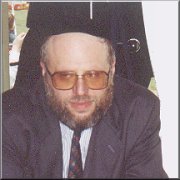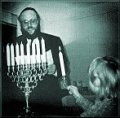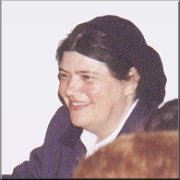|
Interview:
Rabbi Walter Rotschild
1. Without going into a lengthy
autobiography, what caused you to making Judaism so central to your life?
 Judaism
was always important to my family. My father was very active in our local
synagogue (on the Vorstand in different posts for many years.) We attended
Friday night services regularly at the Bradford Synagogue, and sang the
hymns in the car (!) on the way back home. By the time I was 8 or 9 I knew
the Friday service by heart, and then sang in the very small synagogue
choir until my voice broke. So - the home background was there. Judaism
was always important to my family. My father was very active in our local
synagogue (on the Vorstand in different posts for many years.) We attended
Friday night services regularly at the Bradford Synagogue, and sang the
hymns in the car (!) on the way back home. By the time I was 8 or 9 I knew
the Friday service by heart, and then sang in the very small synagogue
choir until my voice broke. So - the home background was there.
Also - belonging to a very small synagogue meant that every
member was known and valued, and you had to join in !
Judaism remains central to my life because I perceive it
to me the only system of thought and religion that allows for personal
doubt and anger, that allows for tolerance of other religions, and that
doesn’t offer silly answers. In other words, I perceive it to be a
religion that makes sense to me as an adult.
2. What is your denominational history? How were you
raised? What denominational affiliation do you currently hold? How
important is denominationalism to you personally and to Judaism as a
whole?
 The
synagogue I grew up in belonged to the "Reform Synagogues of Great Britain".
(This was very much influenced in the 1930’s and 1940’s by refugees from the
German Liberal movement, and the word "Reform" does not have the same
meaning as it does, say, in America.) As a youngster I attended the summer
camps of the Reform Synagogue youth movement. I grew up knowing the Reform
liturgy and the way of life, which does NOT involve feeling guilty that one
is not Orthodox. (My parents married in the Orthodox synagogue but, because
my father was more used to the German style, they joined the Reform.) The
synagogue I grew up in belonged to the "Reform Synagogues of Great Britain".
(This was very much influenced in the 1930’s and 1940’s by refugees from the
German Liberal movement, and the word "Reform" does not have the same
meaning as it does, say, in America.) As a youngster I attended the summer
camps of the Reform Synagogue youth movement. I grew up knowing the Reform
liturgy and the way of life, which does NOT involve feeling guilty that one
is not Orthodox. (My parents married in the Orthodox synagogue but, because
my father was more used to the German style, they joined the Reform.)
In Bradford there are (still) two synagogues; the earlier one (ca.
1870) is the Reform, maintaining a lot of West European traditions; the
later one (ca. 1890) is the Orthodox, maintaining a lot of East European
traditions. That means that, uniquely in Britain, the two synagogues are
friendly with one another, because no one can accuse the Reform of having
come along later! We had a joint youth club at one time, and in 1994 there
were even discussions (unsuccessful so far) about merging the two, as they
are both mow small and struggling financially. But this
means I grew up thinking that Orthodox and Reform could co-operate and be
friendly, and it was a big shock to go to University and discover that this
was considered impossible everywhere else! But I became involved not only in
the "Jewish Society" (which ran Orthodox-style services), but also with the
"Progressive Jewish Society", and later became the national leader of
"Progressive Jewish Students", organizing seminars for students of whatever
background (or none). Technically this group was financed by both the Reform
and the Liberal synagogue movements in Britain.
Still later I went to Leo Baeck College, which is sponsored by
the Reform and the Liberal movements, trains also rabbis for the Masorti
(Conservative) synagogues, and graduates serve all over the world in a
variety of congregations, ranging from Orthodox to Reconstructionist.
 The
College is tiny, but the students are exposed to as wide a variety of
congregation as possible; as a Student Rabbi I served two Liberal and one
Reform congregation, for a year each, and attended a variety of movement
seminars and conferences. The
College is tiny, but the students are exposed to as wide a variety of
congregation as possible; as a Student Rabbi I served two Liberal and one
Reform congregation, for a year each, and attended a variety of movement
seminars and conferences.
I still felt more ‘at home’ in the Reform, and took a post in a Reform
synagogue in Leeds; here, we were the only synagogue which was not
"Orthodox" (at least in name), and that meant that any Jew in the whole area
who did not "fit in" to an Orthodox congregation would belong to us - some
were essentially traditionalists, but had perhaps married a Reform convert;
at the other extreme, others were atheists who wanted to ensure that they
would eventually have a Jewish burial! It led to a lot of very interesting
tensions. But we used the new Reform prayer books, women were fully equal in
the services and the administration, and we played a part in regional and
national movement work. I was a member of the RSGB "Assembly of Rabbis".
I also got involved in "Limmud", an informal organization which, uniquely in
Britain, works across all the denominational boundaries, so that Orthodox
and Liberal rabbis could sit in the same room and learn together and from
each other. This organization is close to my heart, and I have attended the
annual week-long conference maybe 12 times in the last 15 years.
Still later I worked in Europe - in Vienna where the "official"
community was able to cope with, and subsidize, all sorts of
congregations- but couldn’t accept the Progressive one. That was sad, for
Vienna is an international city and a lot of Western Jews were / are
living and working there in various organizations, yet the community was
afraid to assist them to pray in a manner which they found comfortable. In
other European cities I found often the same problem - not so much a
"denominational" issue, more a fear of the unknown and a fear of the
community dividing, which led to many communal leaderships trying to find
an Orthodox rabbi to run a not-very-Orthodox congregation. This is,
usually, a recipe for disaster, but they could not see this.
So I went to a Dutch island in the Caribbean where I was the
only Rabbi for everyone, and had to care for an enormous variety of
tourists, ranging from ultra-Orthodox Jews from Brooklyn to very
assimilated Jews from Argentina, and lead services to suit whatever the
particular minyan that day desired. A very educational experience.
And when I accepted offer of the Berlin position, it was
precisely because, although I am designated the "Liberal
Gemeinderabbiner", it was within a community that at least was trying to
be a real "Einheitsgemeinde" - which means that the denominations exist,
but within a framework of mutual co-operation and tolerance. This is very
unusual but, as I have indicated, makes me feel more "at Home" (though the
scale is very different!)
I think denominations are important. I think Jews are a varied
people - we say in the Shema that "God is One", not that "Israel is
One" - but I think the denominations should exist to enable Jews to run
synagogues, publish liturgies, organize youth camps and so forth, and
should not be used as an excuse for adding to communal argument. And I
know that the words used to describe the denominations - "Ultra-Orthodox",
"Orthodox", "Hasidic", "Reform", "Liberal", "Conservative", "Progressive",
"Reconstructionist" or whatever - mean different things in different
countries, and different things to different congregations. It is rare to
find two synagogues that are alike.
3. Judaism rests on three major categories: God, Torah
and Israel. How do you currently understand each of these terms?
God - our awareness that there is a Power in
the Universe that is greater than human power, that pre-existed and will
post-exist, that is a power of creation.
Thora - al aspects of our tradition and
awareness of God. Not just one book dictated on one occasion, but an ongoing
process of learning what God means in each generation.
Israel - those who seek to "struggle with
God" (which is what the word means) in a constructive and Jewish way,
because they know that this is important to them even if they don’t know
why.
4. What do you believe to be the central challenge
facing contemporary Judaism
a. in general
The central challenge facing contemporary Judaism is for it to
learn that it is a religion for Adults, not Children; that it is a deep
and pragmatic religion that does not offer silly and simplistic answers to
Life’s difficult questions but at least respects the person asking those
questions. That it is not just a ceremonial or a list of dietary
restrictions, but a conscious and conscientious effort to "struggle with
God" and with the meaning(s) of Life.
And our problem is that we have been distracted too easily by
various forms of fundamentalists, all of whom offer only a simple
answer when the questions are really much more complex.
b. in Berlin
The central challenge in Berlin is two-fold: Firstly: To stop
being an "island" where everything is done only because that is the way it
has always been done in Berlin... There is a big Jewish world, with an
enormous variety of religious and political and cultural creativity - and
Berlin, once a center of this creativity, has become a backwater. There is
a lot that can be learned by observing how other communities deal with
certain issues - of synagogue organization, or services, or education, or
integration, or whatever.
Secondly - if this is possible - to transform the very real
problems caused by being in the former capital of a murderous regime, into
something positive and creative. Now that many of the community are either
of a later generation or come from different countries, this should become
possible.
5. How are you addressing these challenges
How am I addressing these challenges? By being Me. Because that
is all that any Rabbi can ever do, if he is to each honestly. By being a
Rabbi who is NOT a Berliner, but who grew up in an offshoot of the German
Jewish tradition; by being a Rabbi who has seen a bit more of the Jewish
world than many of the community, and who is therefore an active symbol
for some of what can be done. So - a bit of an insider, a bit of an
outsider.
6. Given that this interview is being used as an
introduction to you and your work, what three things do you want people to
know about you?
I am a mixture - conservative in some
elements, radical in others. I think most people are like that, which is
why I do not like people to be simplistically labeled as either one or the
other.
I am either an optimistic cynic or a cynical optimist
- that means, I always think that things could go well, even while I am
expecting them not to.
I am human. I have learned that many
people see a Rabbi as some sort of Superhuman figure, someone who was born
aged 60 with a deep voice and a dignified mannerism, a Tzaddik. Well- I am a
normal person; I get tired, depressed, lose my temper, become impatient, I
have loves and desires and a sense of humor, I have a family with whom I
also want to spend some time - especially at evenings and weekends, when
communities often seem to think the Rabbi should always be available. Add
all this together and the word "human" seems to fit.
7. While your interests are wide is it often true that
teachers have an essential message they wish to impart. Is that true of
you? And, if it is, what is your core teaching?
My core teaching is that we are all mortal and all human. None
of our arguments should go on to another generation.
And - when I am teaching Torah - I want to teach people to read
between the lines, between the words, and to think for themselves a bit.
Not everyone is Rashi - but then, Rashi is not everyone.
8. What is the current focus of your work?
My current focus is trying to learn what is really going on in
Berlin, and what the real history behind certain organizations or
personalities or disputes is. I want to teach the Berlin Jewish community
that it is acceptable to be different from each other, that Pluralism is a
fact of Jewish life and not the result of some genetic aberration, that
cannot be tolerated. I am trying to work out why so many members of the
community are so negative about each other, and what can be done to
transform this from ""Sinat Hinam" (causeless hatred) into
"Ahavat Yisrael" (Love for the people of Israel)
9. What kind of support are you in need of?
Any I can get!People prepared to worship, to learn, to get
involved, to assist in teaching, at whatever level, to tell me the truth
...
And to put up with me when I make mistakes.
10. What helps you to deal with the danger of burn-out?
I wish I could answer this. I have a lot of hobbies and
interests, but the problem is finding time and energy for them. I write a
lot, when I can - stories, poems, songs, history; I like to find new
strength in the Bible and the Liturgy, every time I use them, and I am
writing commentaries on these as well. I enjoy travel, and music, and
reading - especially history. I have terribly little time for friends - or
for family - and keep meaning to manage my time and energy better.
11. When have you been amazed about yourself during the
last time?
I have adapted to a variety of communities in a variety of
climates, picked up enough language to get by - and have been amazed in
recent weeks to get warm letters from former members in Leeds, Sheffield,
Vienna and Aruba, who all felt that I had influenced their lives in a
positive way. That has been an enormous boost, and helps me to deal with
criticism.
12. What is your vision
a. for yourself
The vision keeps changing. I’d like, I thin, to have some sort
of impact on "the community", but I know that all rabbis are mortal and,
even if they are remembered at a communal level after they have dies, it
is usually only in a partial and inaccurate way. But I also know that, at
a personal level, rabbis can make an enormous difference.
 I
would like to be able to work consistently in such a way that I can keep
finding new ideas, keep finding more humor, and keep reasonably healthy
until a ripe age. I
would like to be able to work consistently in such a way that I can keep
finding new ideas, keep finding more humor, and keep reasonably healthy
until a ripe age.
b. for your family
I am aware of the dangers to Rabbis’ families - that they are
expected to be "better" than other families, that the children are
expected to be more "religious" than their schoolmates. I think this is
wrong, and I want to protect my family from this misunderstanding.
Basically, I would like my children to grow up to become healthy and aware
and self-confident adults, and I would like my wife to stay "my wife" as
well as "the Rebbetzen", and I would like to stay her husband and not just
"The Rabbi".
c. for Judaism
For Judaism - there is a mission to fulfill, to make the world a
better place, one that is aware of the power of God. ("Letakeyn Olam
b’Malchut Shaddai".) We haven’t finished that mission yet, and even if
- to cite "Pirke Avot" - we never manage it, that doesn’t mean we should
stop trying. So I would like Judaism to waste less energy on internal
communal political struggles and more time on bringing the world to an
awareness of God’s Power and God’s Love. But it won’t be easy.
(January 1999; questions by Iris Noah)
Rabbi Walter Rothschild was the liberal Rabbi of Berlin`s Jewish
Community from 1998 - 2000. Actually he is the rabbi of Beth Shalom in
Munich and officiates regularly in Cologne (Gesher LeMasoret). He lives in
Berlin.
Rabbiner Walter Rothschild:
Kaschruth - pikant gewürzt
Mit britischem Humor will Rabbiner Walter Rothschild die jüdische
Gemeinde in Berlin umkrempeln
 [Hanukah]
[Rabbis in Berlin] [Hanukah]
[Rabbis in Berlin]
|